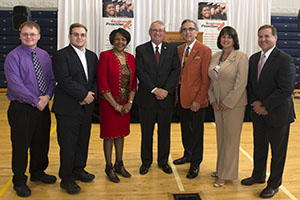April 26, 2016
SVSU announces new scholarship for Saginaw Promise students
 Saginaw Valley State University has established a new scholarship to provide additional financial support for students who reside within the Saginaw Promise zone. The Saginaw Urban and Civic Partnership Scholarship will provide up to $3,000 annually for up to 10 students who meet the criteria and attend SVSU. The scholarships are renewable for up to four years.
Saginaw Valley State University has established a new scholarship to provide additional financial support for students who reside within the Saginaw Promise zone. The Saginaw Urban and Civic Partnership Scholarship will provide up to $3,000 annually for up to 10 students who meet the criteria and attend SVSU. The scholarships are renewable for up to four years.
President Don Bachand announced SVSU’s commitment to the Saginaw community during his keynote address at the Saginaw Promise luncheon Tuesday, April 26 at the Saginaw Arts and Sciences Academy.
“Saginaw is important to us,” Bachand said. “The young people in Saginaw are especially important to us. We want to work more closely with the Saginaw Promise and other groups locally to provide opportunities for lifelong education. Our future depends on it.”
Workforce data by the Lumina Foundation shows that by 2025, 60 percent of jobs in Michigan will require a college degree or postsecondary certificate. Only 33 percent of Saginaw County residents currently have completed at least an associate’s degree.
Students who receive the scholarship will be expected to engage in one or more service projects aimed at encouraging students within Saginaw Public Schools to pursue higher education.
SVSU will begin awarding the scholarships for students enrolling in the 2016-17 academic year.
The Saginaw Promise provides scholarships for eligible students who reside in the City of Saginaw, Zilwaukee, Kochville Township and the portion of Buena Vista Township designated to the Saginaw Public School District. For more information, visit www.saginawpromise.org.
SVSU is nationally recognized for its commitment to community engagement.
In 2015, SVSU received the Community Engagement classification from the Carnegie Foundation for the Advancement of Teaching, a distinction achieved by only 7 percent of U.S. colleges and universities. By their senior year, 84 percent of students have engaged with community employers and agencies in internships, field placements or some other component of their academic preparation.
National research has shown that students who are engaged in the community and on campus are more likely to be successful academically, and to have the critical thinking, problem-solving skills, self-efficacy, and adaptability desired by employers.
